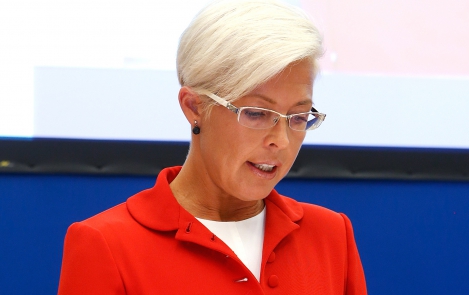-
Reset
+


Evelin Ilves at the annual conference of the WHO Regional Committee for Europe in Copenhagen, 17 September 2014
17.09.2014
Mr Executive President,
Madam Regional Director,
distinguished delegates,
Thank you for the opportunity to address the highest governing body of the WHO European region on this very important topic – food and nutrition and their effects on health, especially non-communicable diseases.
I would also like to take this opportunity to thank the Regional Director for inviting me to contribute to the work the WHO European region does on NCDs. I am happy to be part of this hardworking team in my role as a Champion for Health.
When reading the Action Plan you are about to discuss, I was happy to see all of the important aspects of supporting healthy balanced nutrition included in it.
I would like to particularly highlight the importance of healthy food environment for children and establishing healthy nutritional habits already during childhood. For that, we need to ensure that messages of healthy nutrition and meals that the children receive at home and at kindergartens-schools are mutually supportive.
Three years ago I had the honour, together with Mrs Jakab to participate in a seminar organized by the Finnish Embassy in New York, where I described Estonia's experiences improving the quality of school meals. In many countries in our region we continue the tradition of serving a hot meal in school at mid-day. We must see school meals as an opportunity to develop a child's ability to make healthful food choices happily, not through coercion. During the last 8 years as spousewife of the Estonian President, I have visited tens of Estonian schools. I have seen with my own eyes how in a small rural school for the same amount of money as in a large city school children are offered freshly baked bread, fresh salads, vegetables and meat from local farms, fresh fish. At the same time, in a city school children are given macaroni cooked into a mush along with heated up, industrially produced, ready-made food.
While healthy school meal is important, it is not enough. Maintaining health is not about healthy-unhealthy food, but about sustained healthy balanced nutrition or diet. The key here is the skills, ability and desire to cook themselves from fresh ingredients. We know that children take after example. But somewhat curiously, today sometimes we are in a situation where a child, after having attended an interesting cooking lesson or after having had a tasty, well presented meal at school, goes home and guides the parents on healthy nutrition, and asks to prepare a meal together, instead of buying it ready-made from store. Sometimes children learn faster, are more open and have better understanding that health, nutrition and environment are, as DG Chan often says, "parts of the same "ball"". We grownups should then learn from our children.
We are, indeed, made of what we eat. Food is not merely fuel, but it is also a matter of culture, health and upbringing, and an important building material for the continuous renewal of our physical body. The nutritional choices in childhood are among the determinants of health and therefore also of quality of life for years to come.
Ladies and gentelmen,
The Action Plan rightly calls for re-enforcement of health systems to promote healthy diets by providing evidence-based information on nutrition, best practice examples and guidance. Special emphasis is duely on primary care providers.
Last year, I renewed my medical licence after having not practiced for several years. During the renewal-process, I worked as an intern in GP centers and departments of hospitals. Based on that experience, I agree with the statement in the Action Plan, that the skills and knowledge to enable counselling in nutrition, or more generally in life-styles, are still low or uneven among health care professionals. Debate on whether and how the curriculas in medical schools should contain courses on nutrition as a distinct discipline is ongoing already for years. In addition to developing capacities and skills of health professionals for providing evidence-based health advice, there are two key factors that determine whether the full potential of health professionals can be realised. These are time and money, allocation of both has to be kept in mind.
Honorable delegates,
I shall listen attentively to your statements and debate on the Action Plan, with the aim to seek inspiration and to better understand how I could contribute to the implementation of the Action Plan in my capacity as Champion of Health for NCDs in the WHO European region.
Thank you for your kind attention.




